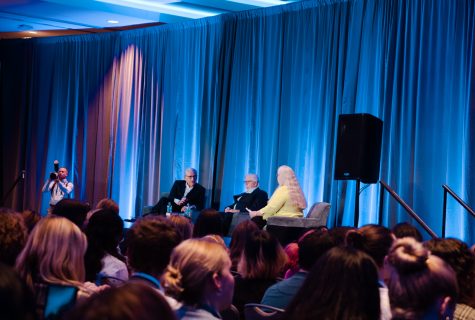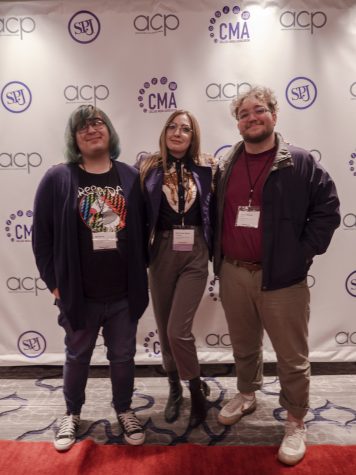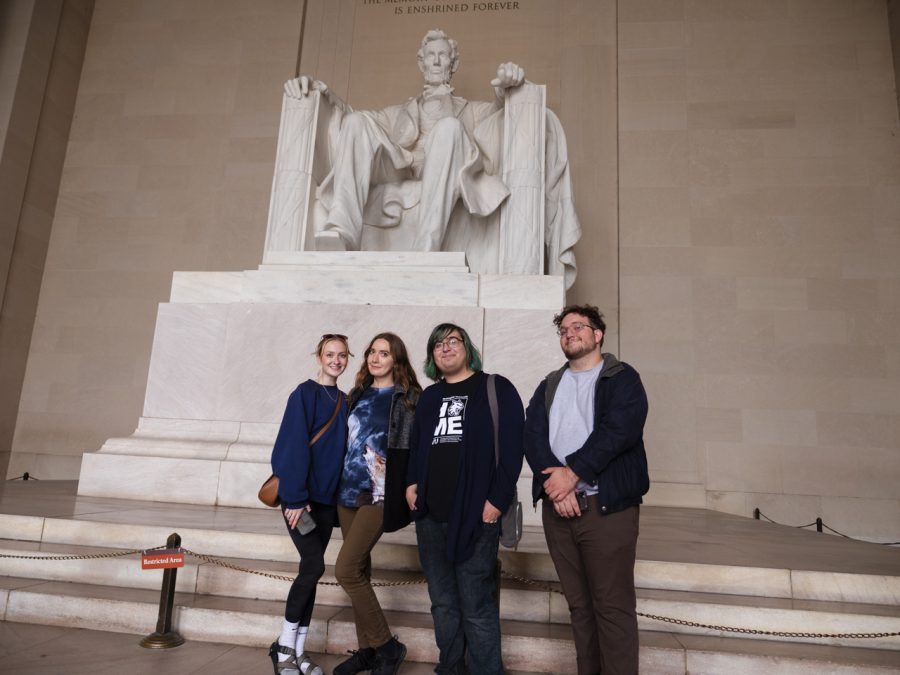MediaFest22: CWU editors journeyed to Washington D.C. for communications convention
November 3, 2022

Between workshops, keynote speakers and mingling with journalists from across the nation, MediaFest22 provided CWU student media editors with an experience that will leave lasting memories and resonating impact.
Four editors from The Observer and one editor from PULSE magazine were sent on behalf of the Communications department to Washington D.C. where they learned from all walks of journalists. Keynote speakers included Bob Woodward and Carl Bernstein who broke the story of Nixon’s Watergate Scandal as well as John Quiñones, host of What Would You Do? on ABC News.
Networking connections
The convention kicked off with a cocktail mixer where publication staff members found like-minded conversation in the bustling foyer of the Grand Hyatt hotel. The Observer editors compared and contrasted publication styles with sophomore Anna Colletto, Editor-in-Chief (EIC) of the University of Missouri student newspaper, The Maneater.
Initially, the name of the publication stood out and required more explanation.
“We were founded in the ‘50s, and at that time the phrase man-eating tiger was very popular,” Colletto said.
Colletto recited a quote from Joel Gold who founded The Maneater: “A maneater is a tiger with its fangs bared and its claws sharpened, ready to analyze the facts and then to pounce.”
The Maneater has 34 people on the editorial board and over 200 staff members who volunteer to keep the publication running, while in contrast The Observer is a practicum course as well as a publication with a full staff of less than 20 people and about 10 people on the paid editorial staff.
Colletto said she added six new positions to her editorial board when she became EIC, including a dedicated marketing and strategy director as well as a data and investigative team that teaches incoming reporters how to analyze and request access to data.
While the convention was teeming with student journalists, many of them were also interns for professional news outlets as was the case for Georgetown student and CNBC intern Jack Pedigo.
“It’s exciting to see how the Mediafest offers professional advice and experience to journalists of all ages, from college journalists who are looking to enter the field after graduation all the way up to established journalists at large organizations who are here to give back to the younger generation,” Pedigo said.
Liza Zycherman, Deputy Legal Director and Policy Counsel for the Reporter’s Committee of Freedom of the Press, said this was her first time attending the convention.
“I’m thrilled to be here,” Zycherman said. “I love talking to journalists because my job as a media lawyer is to develop a body of law that supports good journalism … I don’t really know what journalists need until I talk to them.”

Keynote speaker wisdom
Friday boasted a keynote speaker panel of women who spoke on diversity and overcoming adversity in the workplace. The panel included Darlene Superville, a White House correspondent for the Associated Press, Juana Summers, co-host of NPR’s “All Things Considered,” and Pauly Denetclaw, a political correspondent for Indian Country Today.
When asked what each panelist does to take care of their mental health in the workplace, Denetclaw said simply, “I go to therapy.”
Denetclaw said she was working on an “extremely traumatic” story, which prompted her to prioritize and recommend seeing a therapist.
Superville said exercise and yoga keeps her sane when covering the 24/7 White House beat.
“It’s important to carve out little moments for yourself,” Superville said.
According to Summers, having people in her life who aren’t connected to journalism is key to her mental wellbeing.
“My spouse is not a journalist, we don’t talk about my job a lot unless there’s something that I’m really excited about,” Summers said.
When speaking about objectivity, Denetclaw said there is no such thing and that the term can better be described as fairness.
“We all bring something to the table, and it’s impossible to be completely objective about most things,” Denetclaw said. “What you can do in journalism is be fair, make sure all sides of the story are represented.”
Saturday brought a coveted opportunity to listen to none other than Woodward and Bernstein speak, subjects of the film “All the President’s Men” and pioneers of the “Bernstein method,” where they located the homes and knocked on the doors of sources they needed, calling as late as 11 p.m. for the scoop on the Watergate scandal.
The moderator began by quoting Nixon as having said that journalists need to “dig deeper for the truth” when investigating, an ironic statement to have been made at the same convention where Bernstein and Woodward laughed 50 years after releasing their groundbreaking coverage.
When speaking about the “Bernstein method” and how it led to their success, Bernstein said: “People want to tell the truth more often than not, including people who have their own truth that may turn out to be contrary to what is actually factual … I just wanted the source to keep talking so I kept asking for another cup of coffee and another cup of coffee … and then she told me there was a secret fund and it was controlled by a certain number of top officials.”
Woodward expressed his views on getting your foot in the door with nervous sources: “What’s true about the best sources is that they’re forthcoming but not forthcoming, and there was this hesitancy so we had to make it appear that we knew a lot more than we did, which happens in reporting because you never know enough.”
Interviews in underground parking garages, subpoenas for confidential notes and incredulity of colleagues later blossomed into the investigative stories of a lifetime, and after their success Bernstein and Woodward said their publisher Katharine Graham sent them a note stating: “Now you wrote some of the stories about Watergate, and Nixon resigned. Now don’t start thinking too highly of yourself, and let me give you some advice … Beware the demon pomposity.”
Woodward said this was good advice in 1974 and remains so in the present, applying to journalists to politicians to people working in Hollywood.
“The demon pomposity walks the halls of too many of our institutions and Katharine Graham had a profound insight about the danger,” Woodward said. “We can’t be in this world of self-congratulation.”
Humble and grounded words for men with such recognizable legacy within the industry of journalism.
The final day of keynote speakers featured Fellows of the Society within the Society of Professional Journalists; Fellows included Roland Martin, CEO of Nu Vision Media, Bill Whitaker, host of 60 Minutes on CBS, Clarissa Ward from CNN, Jerry Green, the only reporter who covered every single Superbowl game, and John Quiñones, host of What Would You Do? on ABC.
Martin stressed the importance of what work you do versus where you do it, and understanding your own impact.

“I would rather have a job with a smaller place with larger responsibilities than a place at a larger company with small responsibilities,” Martin said.
Whitaker talked about how his job as a broadcast journalist at CBS News was the best job in America.
“This job has taken me all over the world,” Whitaker said. “I’ve been to every continent but Antartica … I’ve been to 61 countries, 49 states, and I will get to North Dakota some day. I’ve interviewed presidents, scientists, athletes, artists, movie stars. I met a pope. I’ve interviewed some of the kindest people you’ve never heard of and some of the worst people you never want to meet, murderers on death row and drug dealers in prison for life. I have seen a lot. I saw the space shuttle Challenger explode just after lift-off … I was there when Nelson Mandela took the oath of office as the first Black president of South Africa, and 20 years later, I was there to cover his funeral … I’ve spent nights with homeless people on the streets of Los Angeles, days with U.S. troops in Afghanistan, weeks with migrants at the U.S. Mexico border, and months on the presidential campaign trail, and one really long year covering the OJ trial … from my almost four decades in journalism, I have come to see the commotion of American life kind of like jazz.”
Quiñones took the stage next, providing insight about life as a migrant farm worker who didn’t speak any English when entering grade school, and whose teachers told him to study wood shop or mechanics instead of pursuing journalism. He said he used to be paddled in school for speaking Spanish.
“Noone on television, certainly not network television, looked like me,” Quiñones said. “Noone came from the same kind of world that I grew up in.”
Quiñones said his English teacher in tenth grade, Teresa Gonzalez, encouraged him to try journalism. Quiñones said he also benefited from the government program Upward Bound. Eventually, Quiñones took a job in broadcast journalism in Chicago where he wrote a story going undercover as a Mexican immigrant and paying a coyote smuggler 300 dollars to help him inner tube across the U.S. border, captured on a hidden camera.
Quiñones later went undercover working in a restaurant with undocumented workers living in the basement. The workers were unpaid for 17 weeks. Quiñones slept in the basement, washing dishes by day and interviewing by night.
When he came back to the restaurant one day with a camera crew suddenly speaking fluent English, the owner had to be chased through the parking lot and the U.S. government later shut down the restaurant and provided payment and temporary visas to the workers.
“Those were the kinds of stories that, particularly as a Latino reporter, that I could tell better than anyone,” Quiñones said. “That story got my first Emmy award.”
Equally as beneficial to attendees as the keynote speakers were the individual workshops, featuring a range of topics from inclusivity in the newsroom to empathy building to techniques for managing employees and conducting investigative reports.
Workshop highlights
One stand-out workshop was titled “Turn an idea into a job and a job into a career” by Manager of Graduate and Global Programs at Elon University, Maggie Mullikin.
Mullikin provided resources for building resumes, connecting with other professionals and creating an online presence. She had an uplifting spirit to her presentation.
“The impact that I always hope to have is to energize young people, encourage them and make them recognize how much they’ve already accomplished at such a young age,” Mullikin said. “A lot of people struggle with self confidence, so to be able to hear someone say, ‘be proud of what you’ve accomplished and look where it can take you’ and sit down and write that letter about yourself, write down your strengths you know you have and what you know you’ve contributed to your paper and your classes and to your family … the students I tend to meet here are full of energy and gifts, and just to be able to have an impact where they sit up a little taller and take pride in their work just brings me so much joy.”
Mullikin said the community aspect of a conference like this in turn energizes her.
“I was overjoyed, there was standing room, we ran out of time, people waited to talk … that too gave me so much joy because it means what I said resonated and what I said made the people in the room ask really thoughtful questions and share,” Mullikin said.
Colletto, EIC of The Maneater, said the most memorable workshops to her surrounded data analysis and a workshop called “Championing All Journalists: Amplifying New and Diverse Voices.”
“I really enjoyed all the talks about inclusive and equitable workplaces and newsrooms,” Colletto said. “I want to leave the newsroom better than I found it….a more inclusive and equitable space for everyone who is part of it and reflecting that in our coverage and in our internal culture.”
Colletto said she intends to implement what she learned at MediaFest in her newsroom by “championing up weekly or bi-weekly records requests, just getting ourselves as much information as we can as consistently as we can. We’re also going to try to apply for some reporting grants to cover the charges that might be associated with records requests.”
After her workshop called “Hot Topics in Media Law”, Deputy Legal Director and Policy Counsel Zycherman recommended that journalists “connect yourself to the Student Press Law Center. They offer amazing resources for journalists so you know what your rights are.”
MediaFest22 offered a wide spectrum of experiences and ways to engage, with roundtables and meet-ups for all walks of humanity. Many attendees felt the connections made were a major benefit of the gathering.
“Sometimes in student media, we can feel really isolated in our bubble,” Colletto said. “But there are so many college newspapers across the country, and getting to interact with people like you, other Editors-in-Chief, people who are championing up really incredible and innovative work, was so fun.”

